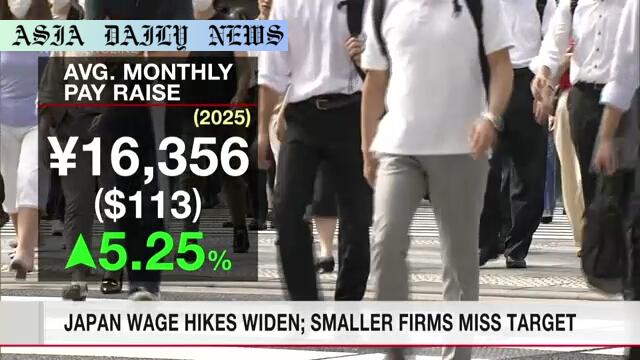Wage Increases: Japan’s average wages surpass targets, but smaller firms fall short amid rising costs and sluggish demand.
Japan’s average monthly wages increased by 5.25%, exceeding a 5% target.
Smaller firms missed the wage-raise goal with only a 4.65% hike.
Large firms saw record-high bonuses at an average of 990,000 yen.
Economic pressures on smaller firms included rising consumer prices and cost challenges.

Record Wage Growth Among Japan’s Largest Companies
Japan has witnessed an impressive surge in wages this year, as the nation’s largest firms achieved wage hikes averaging 5.25% during spring negotiations. This increase, surpassing the Japanese Trade Union Confederation’s 5% target, reflects the country’s economic resilience amid global uncertainty. A total of 5,100 companies participated in the survey as of July 1, showcasing a notable increase of 0.15 percentage points year over year.
The wage growth reflects sustained efforts by Japan’s largest labor group, Rengo, to ensure fair pay amid rising living costs. However, this increase is not without its disparities. While large corporations have notably increased salaries, smaller firms, particularly those with fewer than 300 employees, struggled to match the progress. Average salary increases in these smaller firms measured just 4.65%, missing Rengo’s ambitious goal of 6% amid economic challenges.
Challenges Faced by Smaller Firms
The failure of smaller firms to meet wage targets highlights structural economic challenges in Japan’s business environment. These companies, often reliant on local demand, faced difficulties in transferring rising operational costs to consumers. Amid increasing consumer prices, smaller businesses have been squeezed further, impeding their ability to provide competitive wage increases.
With sluggish demand plaguing smaller enterprises, the disparity between large and small firms continues to grow. Without targeted financial support or intervention, experts fear this gap could undermine fiscal equality in the country. Policymakers must address these issues while analyzing long-term trends and considering ways to alleviate economic pressures faced by small-business owners.
Record-High Bonuses Fuel Optimism
In contrast to smaller firms, Japan’s large-scale companies reported record-high summer bonuses this year. The 990,000-yen average, translating to about $6,800, represents a 4.37% annual increase. This marks the fourth consecutive year of consistent growth in bonuses, and it underscores the strength of larger firms operating in highly lucrative industries.
The Japan Business Federation, Keidanren, conducted these surveys using methodologies established in 1981. The record bonus payouts are being celebrated as a testament to economic recovery and the productivity of major corporations. Many employees in these companies look forward to further financial relief in the face of rising costs.
Outlook and Future Implications
While the data paints a promising picture for wage growth and larger corporations’ profitability, it also exposes the vulnerabilities of smaller businesses that play a vital role in Japan’s broader economy. Bridging this economic divide will require policymakers, industry leaders, and labor unions to engage in collaborative efforts. Programs that provide financial relief and infrastructure support may be necessary to ensure smaller firms can remain competitive and share in the benefits of economic recovery.
Ultimately, fostering sustainable growth requires a broader distribution of economic gains across different sectors of society. Japan’s government and economic stakeholders must prioritize actions to balance growth while addressing disparities.
Commentary
Wage Growth and Disparities: A Closer Look
The recent announcement of wage growth in Japan is undeniably encouraging, especially after years of stagnant salary increases in many sectors. Large corporations setting a benchmark by surpassing the 5% wage hike target is a step forward for economic progress. For employees working in these major firms, the increased wages and record-high bonuses represent a tangible improvement in financial well-being amidst a challenging global economy.
However, behind these promising numbers lies an unsettling disparity. Smaller firms, which are essential to the country’s economic structure and local communities, are struggling to keep up. The limitations faced by businesses with fewer than 300 employees—ranging from rising consumer prices to an inability to pass costs onto the end-users—present a critical challenge. This group forms the backbone of Japan’s economy, and their struggle directly impacts regional employment, innovation, and long-term sustainability.
Implications for Policymakers and Stakeholders
The disparity in wage growth highlights an urgent need for targeted policy interventions. Government entities could consider tax incentives, subsidies, and accessible credit options for smaller businesses. Furthermore, addressing structural challenges such as supply chain inefficiencies and improving local demand patterns could provide much-needed relief for small enterprises.
The collaboration between industries, labor unions, and policymakers is crucial at this juncture. Strategic initiatives that encourage fair wage systems across all business sizes will be integral to ensuring economic equality and harmony. Solutions to address wage disparities will not only strengthen the financial well-being of workers but also create a more resilient and competitive economy in the long term.
As Japan continues to navigate these challenges, it sets a precedent for an inclusive and balanced recovery. Other nations grappling with similar issues could look to Japan’s wage growth initiatives as a blueprint, emphasizing the importance of equity alongside economic achievements.


